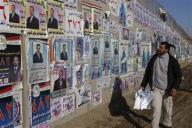 BAGHDAD (Reuters) -When Iraqis last voted in 2005, some in Washington feared the mainly Muslim nation would veer in the direction of Iran, an Islamic theocracy, instead of becoming the moderate democracy they envisioned for post-Saddam Iraq.
BAGHDAD (Reuters) -When Iraqis last voted in 2005, some in Washington feared the mainly Muslim nation would veer in the direction of Iran, an Islamic theocracy, instead of becoming the moderate democracy they envisioned for post-Saddam Iraq.
The question when Iraqis elect new provincial leaders on January 31 will be whether the religious parties that have dominated politics since then can hang on to power despite a bitterness felt by voters starved of services and security.
“Religious parties didn’t keep their promises. They exploited our problems,” said Safaa Kadhim, a teacher in Basra, reflecting anger voiced across Iraq toward the major parties, mostly founded along sectarian lines and seen by many as corrupt and self-serving.
“The voter must be more careful this time, and vote for someone who is deserving,” Kadhim said.
Such rumblings are a warning for Prime Minister Nuri al-Maliki’s Dawa party and the Supreme Islamic Iraqi Council (ISCI) — which represent Iraq’s Shi’ite Muslim majority — and the Iraqi Islamic Party which is the biggest Sunni Arab group.
All face challenges from fledgling tribal and nationalist movements almost six years after the U.S.-led invasion to topple Saddam Hussein, and after years of horrific sectarian bloodshed in which tens of thousands died.
In an opinion poll by the government’s National Media Center in November, 68 percent of those questioned rejected the use of religious appeals in the campaign and 42 percent said they favored secular parties, while 31 percent supported religious parties.
A U.S. official in Baghdad said a steep decline in militia and Sunni-Shi’ite sectarian violence that peaked in 2006 and 2007 had fueled a tentative swing away from sectarian politics.
“We have a long way to go, because it’s very hard to get around identity politics when the only place you felt safe was in your particular community,” he said, speaking on condition of anonymity.
“What I can say is that Iraqis now want to vote for the better candidate, regardless of his religious sect,” said Kaddum al-Muqdadi, a political analyst in Baghdad.
NO MAJOR SHIFT?
Even so, it may be difficult for smaller parties to win ground from established, well-funded organizations and such intentions may not translate into a significant shift in Iraqi politics.
“The major religious parties are better organized, better funded, better armed, and control the media and … government departments that dispense jobs and social services,” said Michael Knights, who heads an Iraq program at the Washington Institute for Near East Policy.
“The seculars are typically divided and poorly organized … As a result, the Iraqi people don’t currently have a credible alternative option to the Islamists in many provinces.”
Iraq was largely secular under Saddam Hussein’s authoritarian Baath party, and Shi’ite religious leaders were frequently harassed or assassinated. Many went into exile in Shi’ite Iran.
Although Shi’ites are now in the ascendancy in Iraq, they have not tried to impose an Iranian-style theocracy with veto power over the state. Iraq’s most senior Shi’ite cleric, the reclusive Grand Ayatollah Ali al-Sistani, has gone out of his way to show he is above partisan politics.
“I have spoken to Ayatollah Sistani about this. He has made it very clear to me that he does not support any one political entity or any candidate,” Faraj al-Haydari, chairman of Iraq’s independent election commission, told a news conference.
Yet the temptation to make voters think a party is favored by religious leaders is strong.
Laws ban the use of religious symbols in campaigns, but black banners with Shi’ite slogans and party insignia are everywhere on the streets of the Shi’ite holy city of Najaf.
Among Shi’ite parties, ISCI has been among the most overt in using religion in its campaign. It prints the names of the Prophet Mohammad and his descendants on the back of campaign cards, ensuring they will not be thrown away by pious voters.
Ammar al-Hakim, a senior ISCI leader, told Reuters that Iraq’s constitution meant it could not be compared to theocratic Iran when looking at religion’s role in politics.
“(The constitution) sees Iraq as a civilized country that respects Islam in harmony with the religious identity of the Iraqi people, and respects their feelings and rituals,” he said.
He bristled at the suggestion that secularists could gain from a perceived incompetence of Islamic parties.
“We don’t see any contradiction in religious observance and expertise. And experience has shown there are religious people who have served the public and secularists who have not.”
Yet devotion may not entirely outweigh dissatisfaction in a country that, while safer, is still shaken by routine bloodshed and where millions still go without electricity and jobs.
For this reason, some observers say, major religious parties have adjusted their message and are fielding more moderate candidates to reflect Iraqis’ priorities today.
“Now, you look at what other sectarian groups are saying, they are saying what we said six years ago,” said Iyad Allawi, the former interim prime minister who heads the country’s largest secular party, the Iraqi National Accord. Allawi hopes to reverse his party’s disappointing showing in 2005 polls.
One of Iraq’s best-known religious figures is not plunging into the electoral arena. Moqtada al-Sadr, who once spoke for millions of poor Shi’ites, will not run his own candidates.
For Nowal Hussein, a Basra housewife, candidates’ religious credentials are secondary. “It doesn’t matter if he’s not Muslim. The important thing is that he’s honest,” she said.
 Eurasia Press & News
Eurasia Press & News